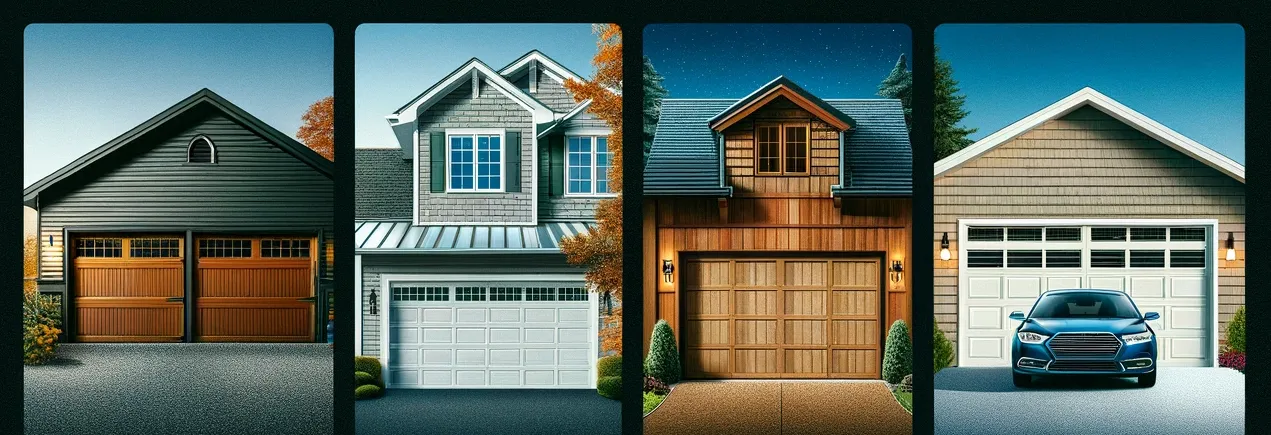Analyzing different garage door materials involves considering factors such as durability, aesthetics, maintenance requirements, cost, and insulation properties. Here's a comprehensive analysis of steel, wood, aluminum, vinyl, and fiberglass garage door materials:
| Criteria | Steel | Wood | Aluminum | Vinyl | Fiberglass |
|---|---|---|---|---|---|
| Durability | 4 | 3 | 3 | 4 | 4 |
| Maintenance | 4 | 2 | 4 | 4 | 4 |
| Aesthetic Appeal | 4 | 5 | 3 | 3 | 4 |
| Insulation | 4 | 3 | 2 | 3 | 4 |
| Cost | 4 | 2 | 5 | 3 | 2 |
1. Steel:
Pros:
- Durability: Steel garage doors are highly durable and resistant to dents and damage, making them suitable for high-traffic areas.
- Low Maintenance: Requires minimal maintenance and is relatively easy to clean.
- Variety of Designs: Available in a wide range of styles, colors, and finishes, including options that mimic the look of wood.
- Affordability: Generally more cost-effective than wood or fiberglass options.
- Insulation Options: Some steel doors come with insulation options, offering energy efficiency benefits.
Cons:
- Susceptible to Rust: Without proper maintenance, steel doors can be susceptible to rust and corrosion, especially in humid or coastal areas.
- Limited Customization: While there are various design options, customization may be limited compared to wood or fiberglass doors.
- Potential for Denting: While durable, steel doors can still dent if impacted with enough force.
2. Wood:
Pros:
- Aesthetic Appeal: Wood garage doors offer a classic, luxurious look and can enhance the curb appeal of a home.
- Customization: Highly customizable, allowing for unique designs, stains, and finishes to match the home's architectural style.
- Insulation Properties: Natural insulation properties provide moderate energy efficiency benefits.
- Longevity: With proper maintenance, wood doors can last for many years.
Cons:
- High Maintenance: Requires regular maintenance, including painting or staining, to protect against moisture, rot, and pests.
- Cost: Generally more expensive than steel or aluminum options, both in terms of upfront costs and long-term maintenance.
- Susceptible to Warping: Wood doors are susceptible to warping and weather damage over time, especially in extreme climates.
3. Aluminum:
Pros:
- Lightweight: Aluminum garage doors are lightweight, making them easy to operate manually or with a garage door opener.
- Low Maintenance: Resistant to rust and corrosion, aluminum doors require minimal maintenance.
- Modern Aesthetic: Sleek and modern appearance, suitable for contemporary architectural styles.
- Affordability: Generally more affordable than wood or fiberglass options.
Cons:
- Durability: Less durable than steel or wood options, more prone to dents and damage from impacts.
- Insulation: Aluminum doors typically have poor insulation properties unless supplemented with additional insulation materials.
- Limited Color Options: While available in various colors and finishes, customization options may be more limited compared to other materials.
4. Vinyl:
Pros:
- Durability: Vinyl garage doors are highly durable, resistant to dents, rust, and corrosion.
- Low Maintenance: Requires minimal maintenance and is easy to clean with soap and water.
- Insulation: Some vinyl doors come with insulation options, providing energy efficiency benefits.
- Affordability: Generally more affordable than wood or fiberglass options.
Cons:
- Limited Design Options: Limited variety of designs and styles compared to other materials.
- Susceptible to Fading: Vinyl doors may fade over time with prolonged exposure to sunlight.
- Not Easily Repairable: While durable, vinyl doors can be challenging to repair if damaged.
5. Fiberglass:
Pros:
- Durability: Fiberglass garage doors are highly durable and resistant to dents, rust, and corrosion.
- Low Maintenance: Requires minimal maintenance and is easy to clean.
- Insulation: Fiberglass doors typically offer good insulation properties, contributing to energy efficiency.
- Customization: Available in various designs, styles, and finishes, including options that mimic the look of wood.
Cons:
- Cost: Generally more expensive than steel or aluminum options.
- Susceptible to Cracking: While durable, fiberglass doors can be susceptible to cracking or splitting over time, especially in extreme climates.
- Limited Color Options: Customization options may be limited compared to other materials.
Each garage door material has its own set of advantages and disadvantages. The best choice for a homeowner depends on factors such as budget, aesthetic preferences, durability requirements, maintenance considerations, and insulation needs. It's essential to carefully evaluate these factors and consult with a professional garage door installer to determine the most suitable material for your specific requirements.

